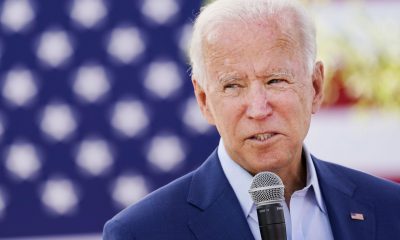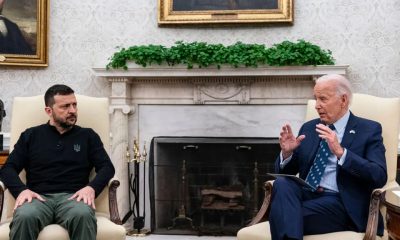International
How war in Ukraine turned Sri Lanka’s economic crisis into a calamity

Life for Hasun Peiris began to unravel a year ago under the pull of powerful forces he didn’t understand.
Climbing food prices drained the 32-year-old woodcutter’s savings, and his family sold their truck. Hunger began to gnaw at their bellies, and they pawned off their gold.
Then, after war erupted thousands of miles away in Ukraine, diesel grew more and more scarce in Sri Lanka, leading to daily power cuts starting last month. Now, Peiris has been forced to scale back his lumber shipments — and his diet. What money he has goes to buying eggs for his pregnant wife.
“I can’t remember the last time I ate chicken or coconut milk,” Peiris said, sitting inside his half-finished house while his five employees idly sorted matchwood in the yard. It was another afternoon wasted, with no electricity or diesel to power his tools and make a living. “I’m afraid,” he said. “I don’t know how to continue.”
Sri Lanka is mired in an unprecedented economic crisis brought on by mostly domestic factors: Years of foreign-debt-fueled government spending, badly timed tax cuts, policies that hurt crop yields and a precipitous drop in tourism during the coronavirus pandemic have hollowed out its foreign reserves.
But Sri Lanka’s teetering finances were dealt another blow this year when war in Europe sent global fuel and food prices surging, turning the small country’s uphill economic struggle into something insurmountable.
READ ALSO:
- U.S., allies plan for long-term isolation of Russia
- ‘Inhuman’ situation in Ukraine’s Mariupol as Russia claims almost full control
- Herdsmen Not Behind Benue Latest Attack – Military
Sir Lanka said Tuesday it needed to suspend international debt payments to save its dwindling dollar reserves for importing fuel and food, both of which are in short supply here, contributing to a devastating inflationary spiral. Over the past six months, central bank data shows, market prices for rice and wheat have doubled.
Diesel prices have shot up 60 percent, leading to widespread shortages and blackouts that have fanned protests across the country demanding President Gotabaya Rajapaksa step down.
“Sri Lanka would be in crisis even if you didn’t have a war in Ukraine, but it’s compounding everything,” said Alan Keenan, an analyst at the International Crisis Group consultancy. “This is the Ukraine effect: a credit line for fuel you thought could last two months now lasts one. Even if you get a bailout, you’re buying less food, less fuel, less medicine.”
“Now,” Keenan added, “is a terrible time to be crashing your economy.”
Last week, the United Nations Food and Agriculture Organization warned that global food prices had risen to the highest level since it began tracking them in 1990, partly due to the war in Ukraine, a major wheat producer. Inflation, the agency’s chief said, will impose “extraordinary costs on global consumers, particularly the poorest.”
As Sri Lanka’s foreign currency reserves fell dangerously in February, the country negotiated a $500 million credit line with India to import oil, which not only powers transportation and industry across the island but also accounts for 40 percent of its electricity generation. That credit line will already be exhausted by this month, said finance minister Ali Sabry, who is seeking more emergency financing from India and other governments.
“Our import bill for essential fuel has almost doubled, particularly with the unfortunate situation in Ukraine,” Sabry said in an interview this week before his ministry announced it would default on nearly $50 billion in foreign loans to prioritize imports.
“Wheat prices have gone up. Freight prices have gone up. It’s all affecting our reserves in a big way,” he said. “Even the United States has high inflation. Everybody is suffering, more or less.”
Growing protests
So far, Sri Lanka’s protests have been mostly made up of young, middle-class professionals who grew up in a decade of relative prosperity, as the nation emerged from decades of civil war, expanded its manufacturing and white-collar jobs, and looked poised to become the next Asian success story.
READ ALSO:
- MNJTF rains multiple missiles on ISWAP Commanders, training camps
- Man, 40, defiles brother’s daughter, gags mouth with pillow
- Man arrested for for ‘stealing’ two children in church
In the past year, these workers have seen their purchasing power and their middle-class futures evaporate. Families gather nightly in places such as the downtown waterfront of the capital, Colombo, to chant slogans against Rajapaska and honk their horns in protest. The atmosphere is festive, but frustration is mounting.
Jay Tissera, a 28-year old graphic designer, took a break from protesting outside the presidential office on a recent afternoon and smoked with his friends — a computer programmer and a journalist — in the shadow of a seaside tower that boasted $1.4 million apartments with sweeping views of the Indian Ocean and interiors designed by a French architect.
“They point to this as development,” Tissera said, pointing up. “But you see, for years the people haven’t developed.”
So far, these demonstrations have been largely peaceful, but officials in both the ruling party and the opposition are worried about where they will lead. They fear a deeper rage could erupt if the poor, who are working overtime just to survive and have not joined the protests en masse, are driven to the streets by hunger.
Eran Wickramaratne, an opposition politician and former state minister of finance, said the government needed to import more food immediately. Last week, India began shipping 40,000 tons of rice to Sri Lanka. But Wickramaratne said it wasn’t enough.
“Those protests are now calm and collected but they might quickly take a different direction,” he said. Wickramaratne shook his head, then waved away the thought. “I don’t even want to imagine it,” he said.
Anger and despair
For many across the capital and on its outskirts, desperation is already setting in.
Outside a busy hospital, Pasinda Fernando, a young pharmacist, confessed with shame and anger that he was beginning to hoard heart medication for his most loyal customers because of a nationwide shortage in imported medicines. “I’m trying my best to reduce prices but the customers are suffering,” he said. “Only when we have a change in government will things get better.”
In another neighborhood, at the front of a line for gasoline that stretched three blocks, K.P. Wimalavathrne, a 61-year old rickshaw driver, said he was eating nothing except five balls of rice noodles a day and sleeping in his back seat. With so much of his time spent waiting for gasoline, “how else can I make money?” he asked, drawing murmurs of sympathy from the crowd of sweaty rickshaw drivers, all of whom had stood for more than two hours to fill up a small jerry can or soda bottle.
Down a coastal road, a group of fishermen were fuming at their elected leader about government officials sneaking into their diesel depot at night to fill up their own vehicles.
Fuel was practically out of reach already, said one of the men, Joseph Anthony Silva. The smaller skiffs lining the pier sit unused, with kerosene unobtainable. Ten-day fishing trips in the bigger boats have been cut to three days because diesel is so expensive, he said. Three meals a day have been cut to two.
Silva fretted about how to feed his family of five and pay loan sharks who he, and other fishermen, are increasingly indebted to as the community has floundered over the past year. Silva owes about $750, or several months’ income, at 20 percent interest, he calculated.
“The loan sharks’ business is so good they’re now open 24 hours a day,” interjected Linton Fernando, another fisherman with growing debts. “They come to our doors and shame us by taking away furniture and gold.”
If fuel and food prices don’t fall, the two men agreed, they would be ruined. As they spoke, a train emerged from a dense palm grove and rumbled across the inlet. Silva nodded toward the barreling locomotive. His mood darkened, his anger folded into despair.
“Soon, there will be no way out of debt,” he said. “No way except death.”
THE WASHINGTON POST
International
Syria not threat to world, rebel leader al-Sharaa tells BBC
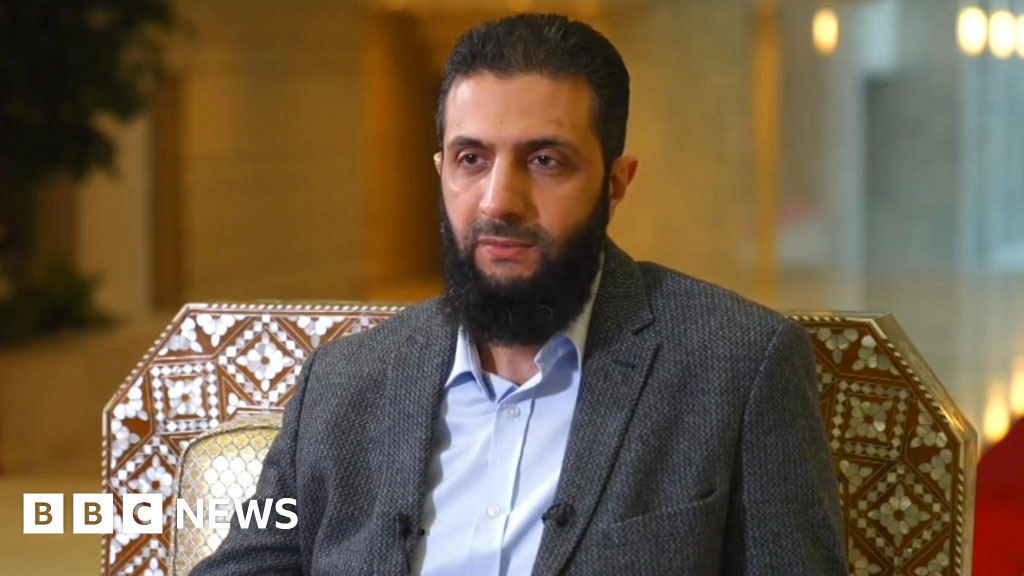
Syria not threat to world, rebel leader al-Sharaa tells BBC
The de facto leader of Syria, Ahmed al-Sharaa, has said the country is exhausted by war and is not a threat to its neighbours or to the West.
In an interview with the BBC in Damascus, he called for sanctions on Syria to be lifted.
“Now, after all that has happened, sanctions must be lifted because they were targeted at the old regime. The victim and the oppressor should not be treated in the same way,” he said.
Sharaa led the lightning offensive that toppled Bashar al-Assad’s regime less than two weeks ago. He is the leader of the Hayat Tahrir al-Sham (HTS), the dominant group in the rebel alliance, and was previously known by his nom de guerre of Abu Mohammed al-Jolani.
He said HTS should be de-listed as a terrorist organisation. It is designated as one by the UN, US, EU and UK, among many others, as it started as a splinter group of al-Qaeda, which it broke away from in 2016.
Sharaa said HTS was not a terrorist group.
They did not target civilians or civilian areas, he said. In fact, they considered themselves to be victim of the crimes of the Assad regime.
He denied that he wanted to turn Syria into a version of Afghanistan.
READ ALSO:
- Tinubu’s 2025 budget will increase poverty, worsen economy – PDP
- Real Madrid outclass Pachuca to win FIFA Intercontinental Cup
- Israel hits ports, energy sites in Yemen after missile intercepted
Sharaa said the countries were very different, with different traditions. Afghanistan was a tribal society. In Syria, he said, there was a different mindset.
He said he believed in education for women.
“We’ve had universities in Idlib for more than eight years,” Sharaa said, referring to Syria’s north-western province that has been held by rebels since 2011.
“I think the percentage of women in universities is more than 60%.”
And when asked whether the consumption of alcohol would be allowed, Sharaa said: “There are many things I just don’t have the right to talk about because they are legal issues.”
He added that there would be a “Syrian committee of legal experts to write a constitution. They will decide. And any ruler or president will have to follow the law”.
Sharaa was relaxed throughout the interview, wearing civilian clothes, and tried to offer reassurance to all those who believe his group has not broken with its extremist past.
Many Syrians do not believe him.
The actions of Syria’s new rulers in the next few months will indicate the kind of country they want Syria to be – and the way they want to rule it.
Syria not threat to world, rebel leader al-Sharaa tells BBC
BBC
International
Israel hits ports, energy sites in Yemen after missile intercepted
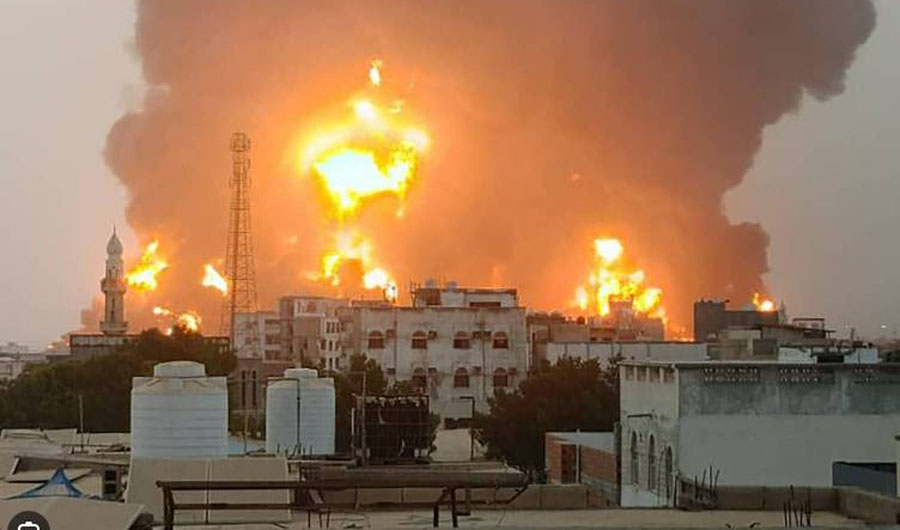
Israel hits ports, energy sites in Yemen after missile intercepted
JERUSALEM: Israel said Thursday it struck ports and energy infrastructure it alleges are used by Houthi militants, after intercepting a missile fired by the group.
Israel’s military said it “conducted precise strikes on Houthi military targets in Yemen — including ports and energy infrastructure in Sanaa, which the Houthis have been using in ways that effectively contributed to their military actions.”
The announcement came shortly after Israel said it had intercepted a missile fired from Yemen.
Al-Masira, a media channel belonging to the Houthis, said a series of “aggressive raids” were launched in the Yemeni capital of Sanaa and the port city of Hodeidah.
It reported raids that “targeted two central power plants” in Yemen’s capital Sanaa, while in Hodeidah it said “the enemy launched four aggressive raids targeting the port… and two raids targeting” an oil facility.
The strikes were the second time this week that Israel’s military has intercepted a missile from Yemen.
On Monday, the Houthis claimed a missile launch they said was aimed at “a military target of the Israeli enemy in the occupied area of Yaffa” — a reference to Israel’s Tel Aviv area.
READ ALSO:
- Gaza mediators intensify ceasefire efforts, Israeli strikes kill 20 people
- PDP expels South-East national vice chairperson over anti-party activities
- Your information on $1bn investment misleading, Dangote Refinery replies NNPCL
Also Monday, an Israeli navy missile boat intercepted a drone in the Mediterranean after it was launched from Yemen, the military said.
The Houthi militants have said they are acting in solidarity with Palestinians and pledged Monday to continue operations “until the aggression on Gaza stops and the siege is lifted.”
On December 9, a drone claimed by Houthis exploded on the top floor of a residential building in the central Israel city of Yavne, causing no casualties.
In July, a Houthi drone attack in Tel Aviv killed an Israeli civilian, prompting retaliatory strikes on the Yemeni port of Hodeidah.
The Houthis have also regularly targeted shipping in the Red Sea and the Gulf of Aden, leading to retaliatory strikes on Houthi targets by United States and sometimes British forces.
Israeli military spokesman Daniel Hagari said the group had become a “global threat,” pointing to Iran’s support for the militants.
“We will continue to act against anyone, anyone in the Middle East, that threatens the state of Israel,” he said.
Israel hits ports, energy sites in Yemen after missile intercepted
International
Gaza mediators intensify ceasefire efforts, Israeli strikes kill 20 people
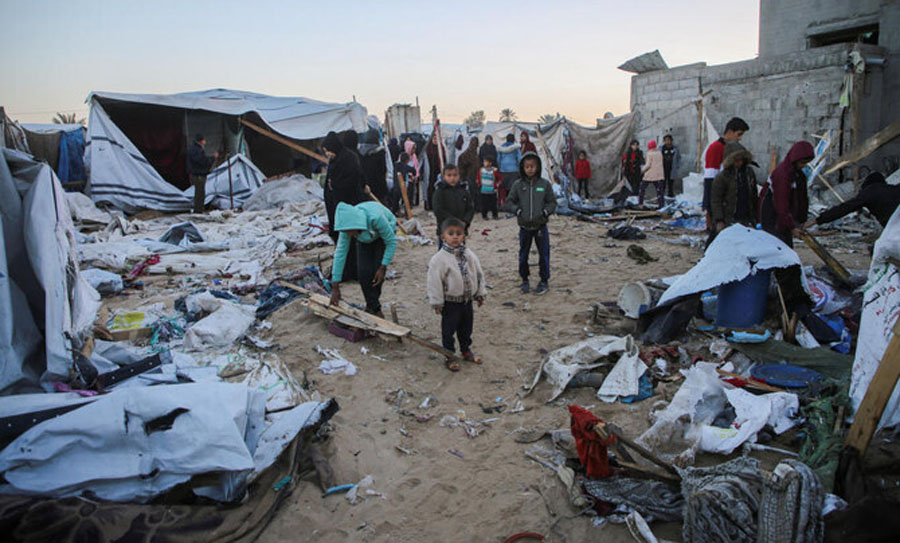
Gaza mediators intensify ceasefire efforts, Israeli strikes kill 20 people
CAIRO: The United States, joined by Arab mediators, sought on Wednesday to conclude an agreement between Israel and Hamas to halt the 14-month-old war in the Gaza Strip where medics said Israeli strikes killed at least 20 Palestinians overnight.
A Palestinian official close to the negotiations said on Wednesday that mediators had narrowed gaps on most of the agreement’s clauses. He said Israel had introduced conditions which Hamas rejected but would not elaborate.
On Tuesday, sources close to the talks in Cairo, the Egyptian capital, said an agreement could be signed in coming days on a ceasefire and a release of hostages held in Gaza in return for Palestinian prisoners held by Israel.
Medics said an Israeli airstrike killed at least 10 people in a house in the northern town of Beit Lahiya while six were killed in separate airstrikes in Gaza City, Nuseirat camp in central areas, and Rafah near the border with Egypt.
In Beit Hanoun in the northern Gaza Strip, medics said four people were killed in an airstrike on a house. There was no immediate comment from the Israeli military spokesman.
Israeli forces have operated in the towns of Beit Hanoun and Beit Lahiya as well as the nearby Jabalia camp since October, in a campaign the military said aimed to prevent Hamas militants from regrouping.
Palestinians accuse Israel of carrying out acts of “ethnic cleansing” to depopulate the northern edge of the enclave to create a buffer zone. Israel denies it.
READ ALSO:
- PDP expels South-East national vice chairperson over anti-party activities
- Your information on $1bn investment misleading, Dangote Refinery replies NNPCL
- Many die at Ibadan children’s Christmas party stampede, organisers arrested
Hamas does not disclose its casualties, and the Palestinian health ministry does not distinguish in its daily death toll between combatants and non-combatants.
On Wednesday, the Israeli military said it struck a number of Hamas militants planning an imminent attack against Israeli forces operating in Jabalia.
Later on Wednesday, Muhammad Saleh, director of Al-Awda Hospital in Jabalia, said Israeli shelling in the vicinity damaged the facility, wounding seven medics and one patient inside the hospital.
The Israeli military had no immediate comment.
In the Central Gaza camp of Bureij, Palestinian families began leaving some districts after the army posted new evacuation orders on X and in written and audio messages to mobile phones of some of the population there, citing new firing of rockets by Palestinian militants from the area.
CEASEFIRE GAINS MOMENTUM
The US administration, joined by mediators from Egypt and Qatar, has made intensive efforts in recent days to advance the talks before President Joe Biden leaves office next month.
In Jerusalem, Israeli President Isaac Herzog met Adam Boehler, US President-elect Donald Trump’s designated envoy for hostage affairs. Trump has threatened that “all hell is going to break out” if Hamas does not release its hostages by Jan. 20, the day Trump returns to the White House.
CIA Director William Burns was due in Doha on Wednesday for talks with Qatari Prime Minister Sheikh Mohammed bin Abdulrahman Al-Thani on bridging remaining gaps between Israel and Hamas, other knowledgeable sources said. The CIA declined to comment.
Israeli negotiators were in Doha on Monday looking to bridge gaps between Israel and Hamas on a deal Biden outlined in May.
There have been repeated rounds of talks over the past year, all of which have failed, with Israel insisting on retaining a military presence in Gaza and Hamas refusing to release hostages until the troops pulled out.
The war in Gaza, triggered by a Hamas-led attack on communities in southern Israel that killed some 1,200 people and saw more than 250 abducted as hostages, has sent shockwaves across the Middle East and left Israel isolated internationally.
Israel’s campaign has killed more than 45,000 Palestinians, displaced most of the 2.3 million population and reduced much of the coastal enclave to ruins.
Gaza mediators intensify ceasefire efforts, Israeli strikes kill 20 people
ARAB NEWS
-

 Railway1 day ago
Railway1 day agoLagos Rail Mass Transit part of FG free train ride – NRC
-

 metro14 hours ago
metro14 hours agoWhy we displayed ‘Jesus Christ is not God’ banner at Lekki mosque -Imam
-

 metro2 days ago
metro2 days agoCourt stops customs from seizing imported rice in open market
-

 metro3 days ago
metro3 days agoIbadan stampede: Tinubu orders probe as death toll hits 40
-

 metro2 days ago
metro2 days agoIbadan stampede: Ooni reacts after arrest of ex-wife
-

 metro3 days ago
metro3 days agoAfe Babalola: Court grants Dele Farotimi bail, barred from media interviews
-

 metro1 day ago
metro1 day agoNIMC warns against extortion, reaffirms free NIN enrollment
-

 News3 days ago
News3 days agoAdebayo Ogunlesi, 2 other Nigerians make Forbes 50 wealthiest Black Americans list 2024







